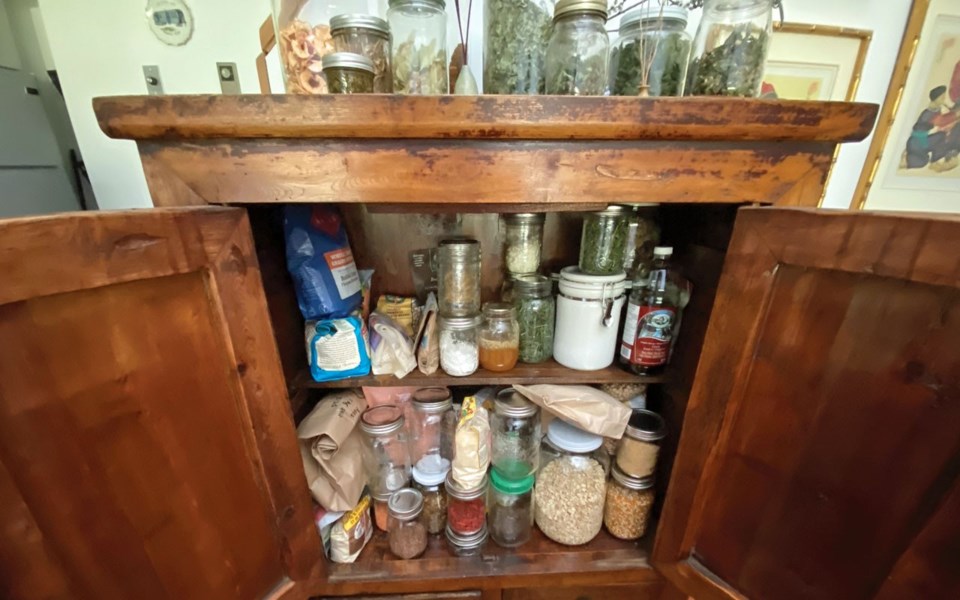Wait—I've been here before... or at least something like it.
Throughout March and April, I had this sensation—strong feelings of familiar having-been-heres, immediately followed by wondering what could possibly feel familiar about a global pandemic that shifted our community's outdoorsy lifestyle indoors and into a hyper-simplified mode.
While the conditions that wrought this change were unusual, the lifestyle we turned to in our household was not. As it happened, some of those outcomes closely aligned with experiences of our Year of No Shopping in 2018 (Pique, "A Year of Living Better," Feb. 10, 2019). There was also a sense of drawing upon an even earlier lifetime, a childhood based in country living and subsistence farming.
Basically, we were once again primarily reliant on and using what we already had, deep-mining bookshelves, art supplies, and cupboards for entertainment and sustenance: All familiar territory despite the differing circumstances. After all, we'd lived an entire year under strict, self-imposed limitations that prohibited any material purchase save groceries. We'd found this clear delineation helpful to prioritize our goal of reducing consumerism, while delivering genuine happiness as a byproduct. This time around, of course, there's a higher level of anxiety, what with intense daily news cycles and loss of employment, but also some strikingly similar silver linings.
I was surprised to experience strange delight in exploring options for our limited supplies and also in stocking cupboards. Having popcorn for dinner was a joyful discovery and cookbooks turned out to be a valuable resource once dusted off. Jars were filled with newly purchased grains and legumes alongside dried herbals gathered the previous summer. Dinners were experimental as we worked our way through some of the more obscure ingredients in the dark corners of the kitchen. It reminded me of childhood dinners, making do with unexpected combos because popping into town to grab something wasn't an option.
Towards the end of our Year of No Shopping, I read an article by David Cain (www.raptitude.com/2018/12/why-the-depth-year-was-my-best-year) that outlined one of his own self-experiments—a "Depth Year"—that got us thinking of committing to one ourselves. The idea is this: rather than continually pursuing new interests or acquisitions, a year is spent delving into your own innate skills, passions, possessions—deepening, in a tangible way, your already existing life:
"A big part of the Depth Year's maturing process would be learning to live without regular doses of the little high we get when we start something new. If we indulge in it too often, we can develop a sort of 'sweet tooth' for the feeling of newness itself. When newness is always available, it's easier to seek more of it than to actually engage with [improving an existing skill]... The consumer economy nurtures this sweet tooth. There's just so much money to be made in selling people new paths—new equipment, new books, new possibilities. The last thing marketers want is for people to get their excitement and fulfillment from what they already have access to... the incredible wealth remaining in what [they] already own."
Reduce, re-use, and recycle was the focus of our no-shopping experiment, and having grown used to it, for months following its end, neither of us was in a rush to buy anything. Even when, over time, new items inevitably showed up—running shoes, a camping stove—it was more a trickle of perceived necessity than indulgence. OK, some indulgence... mostly books.
In hindsight, that year of self-limitations now seems a practice run of sorts for today's enforced lifestyle shift: trips to the grocery store have been greatly reduced in favour of using up stores and deliveries from local small businesses. As a side effect of being home, I've rediscovered what I had sitting around and exercised creativity in utilizing it—repurposing fabric, getting old gear ready for re-use, baking forgotten freezer treasures into crumble pies. The reality is that we could—and should—operate more like this all the time.
A recent article by Anita Makri, "The Surprising Link Between our Consumer Habits and Deadly Diseases" (ensia.com/features/consumer-habits-pandemic-risk), explores how societal standards that go unchallenged can lead to continued destruction of nature, to our clear peril, including amplifying the ability for zoonotic diseases like COVID-19 to make the critical leap into our communities.
The article highlights our collective responsibility to pay more attention. Earth may be particularly—and brilliantly—suited to support the lifeforms it does, but it has taken us too long to face the fact that this all exists in a balance that can be readily tipped into catastrophe, and that our choices have concrete consequences.
While elevated consumption is marketed to us as an ideal to strive for, it's neither personally satisfying nor sustainable for the rest of the living world.
A friend of mine claims she has never experienced déjà vu, doesn't understand the experience and is perplexed by people who claim the sensation of having been somewhere before. I can't say that a rural childhood or a Year of No Shopping fully prepared me for the strangeness of the past few months, but I do know that choosing a year of lower consumption was a pivot in life-as-we-know-it that brought unexpected moments of grace and acceptance that are currently being put to good use.
So. Familiar, yes—but no, we have not been here before.
Asta Kovanen and her partner, regular Range Rover columnist Leslie Anthony, did a Year of No Shopping in 2018. Early in the pandemic, Asta suggested that the non-commercial aspect of self-isolation felt similar in many ways but even more important, and from that grew this week's column.




